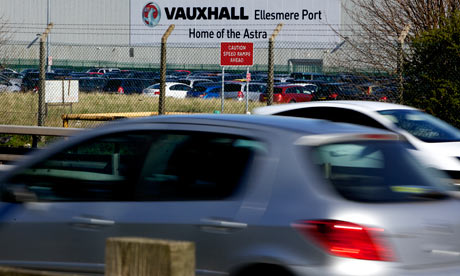
The Vauxhall car plant at Ellesmere Port has been saved from closure, preserving 2,100 jobs and creating 700 more, after workers accepted a deal that will result in the next-generation Astra built at the factory.
The business secretary, Vince Cable, visited the plant on Thursday to mark an agreement that, in a rare reversal of industrial fortune, could lead to the closure of a sister plant in Germany.
The European arm of General Motors, Opel/Vauxhall, will split production of the new Astra model between the Cheshire site and a plant in Gliwice, Poland, with Opel's factory in Bochum, Germany, likely to lose out as a consequence.
Ellesmere Port and Bochum had been chosen by GM executives as the plants most likely to close, triggering frantic lobbying by British politicians and trade union officials that appears to have paid off. GM is attempting to cut losses at its European operations that reached $747m (£470m) last year.
Workers at the plant voted 94% in favour of new pay and conditions under the deal, clearing the way for the £125m investment to go ahead.
Cable, an Astra owner, told the Guardian the government had serious concerns over the future of Ellesmere Port earlier this year. "At the beginning," he said, "we were very concerned because it was clear that GM were committed to substantial downsizing in Europe. But we thought that this was one of the most productive plants and it was not being fully utilised. We had a good story to tell about the British car industry." Cable said the plant had been saved by a "team UK effort" that included officials at the Unite trade union, led by former general secretary Tony Woodley.
Asked about the Bochum plant, Cable said: "I don't want to be triumphalist but the fact that they have chosen to commit to the UK rather than the German plants is a significant statement in a way.
"But rather than dance up and down on Germany I would prefer to leave it as a positive story for us." Cable said he would be "in the market" for buying the new Astra when it rolls off the Ellesmere Port production line from 2015 onwards.
Welcoming the news, David Cameron said: "This is excellent news for Ellesmere Port and for UK manufacturing. Once again we have seen the success of the UK automotive industry and the crucial role it plays in growing and rebalancing our economy.
"This has been a real team effort with the government, the company, unions and workers all focused on keeping production in the UK."
The government is expected to support the expansion of Ellesmere Port through supply chain and apprenticeship initiatives.
Unite's current general secretary, Len McCluskey, said the plant's future had been guaranteed into the next decade. "This is extremely good news for Ellesmere Port. The company has made an offer to the workforce, which our members have accepted.
"From a position of uncertainty earlier this year, there is now a potential for a future at the plant until 2020 and beyond, and with that, 700 new skilled jobs at Ellesmere Port itself, and possibly hundreds more in the supply chain."
The site is 50 years old this year and employs 2,100 workers, plus a further 700 suppliers on the site. The directly employed staff have accepted a new labour agreement that includes a pay deal. Woodley played a significant role in negotiating the deal, which will result in Ellesmere Port ratcheting up to a 24-hour production cycle, from two daily shifts to three.
GM is not the only carmaker scrutinising its European operations. Analysts believe the industry in Europe is more than 3m units over capacity. GM owns seven plants in Europe, including a van factory in Luton, which is not under immediate threat. Ellesmere Port builds the Astra Sports Tourer, making 140,000 models last year. The plant was built in 1962, producing its first car, a Viva, two years later. As well as creating 700 new jobs, the new agreement will see £125m invested in the plant, which will produce a minimum of 160,000 vehicles per year.
The doubts about Ellesmere Port's future have been the only cloud over a UK car manufacturing industry that is enjoying a renaissance from the post-crash lows of 2008-09. Britain made about 1.34m cars last year, an increase of 6% on 2010. A large contributor to the boom is demand in emerging markets for premium cars, such as Minis, Land Rovers and Bentleys – all made in the UK.
However, the mass-produced market has been suffering across Europe and Ellesmere Port has been caught by that crisis. Nonetheless, other mass producers based in the UK, such as the Japanese trio of Honda, Toyota and Nissan – the biggest car producer in the UK – have boosted their British production plans in recent months.
Vauxhall's chairman, Duncan Aldred, said: "This is great news for the Ellesmere Port plant, our employees, the local community, our suppliers, the Vauxhall brand and the UK. We have been able to develop a responsible labour agreement that secures the plant's future. This is assisted by the government's industrial strategy: increasing its focus on the manufacturing sector and creating ideal ground for companies to build up long-term investments."

